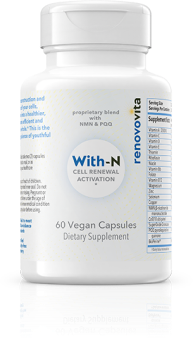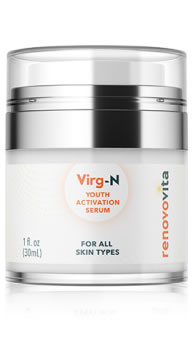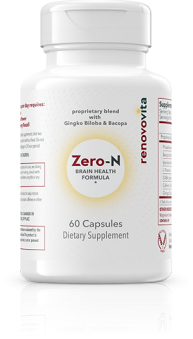THE SCIENCE
Maintaining Cellular Health
is an essential part of a
whole-body wellness
routine.
Cellular Health: The Key To Unlock Whole-Body Health & Wellness
Discover how poor cellular health could be holding you back from achieving your health goals and learn what you can do to overcome it.
Let's be honest for a second. Aging is inevitable and affects our health whether we acknowledge it or not. Most of us know that no magic cure-all will turn back the clock or keep us in peak physical condition. It's a battle to maintain whole-body health and wellness, and that battle becomes more challenging as we age.
Do any of these sound familiar?
- Are your daily wellness routines no longer delivering the results you desire?
- Are you feeling more tired and less vibrant with each year?
- Are you having trouble concealing the physical signs of aging without expensive procedures?
- Are you unable to maintain your competitive edge no matter how hard you athletically train?
If you can relate, you’re not alone. Many people struggle to get the desired results from their daily wellness routines and they are frustrated by mysterious blockers that prevent them from reaching their health and wellness goals.
So this leads us to ask ourselves, why? Are we doing something wrong? Perhaps, but it's more likely that it's something you're missing that is the problem. That something is probably good cellular health.
If you're not familiar with cellular health, don't worry. This is because cellular health is a newly emerging focus of health science. It's also rarely discussed outside of doctors' offices and research facilities. And, when it is talked about, it is only in the context of disease or medical treatments.
The thing is, cells are the basic units of life. They affect every part of us, and if they aren't performing at peak fitness, we can't expect our bodies to either. This missing key leaves most of us stuck in a broken cycle of health routines that aren't achieving our health goals because our cells can't perform at their peak.
The Good Thing Is That Cellular Health Can Be Improved
Whether you want to improve athletic performance, increase mental stamina, support a healthy heart and liver, build muscle, slow the signs of aging, or simply live a healthy life, including cellular health into your health-based routines can give your body's cells the nutrients required to maintain and even return to their optimal performance.
In this article, we will break down everything you need to know about cellular health so you can unlock whole-body health, build productive wellness routines, and finally rediscover a more vibrant you.
What is Cellular Health?
Cellular Health is a health scientific perspective focused on our body's specific requirements at the cellular level. It aspires to enable whole-body health and wellbeing through an inside-out approach to supporting the body's most critical cellular processes at its most basic level. This includes ensuring cells get sufficient nutrients, are protected from external stressors, and function to their highest potential. Our cells become more fragile and don’t function the way they did when we were younger. This breakdown in our cells is what causes aging.
Why Is Cellular Health Important?
Cells make up our entire body and are the building blocks of life, it takes the collective effort of over 37.2 trillion cells to sustain life. Cells achieve this by organizing into specialized groups to perform increasingly more complex bodily tasks. When cellular functions are damaged or not performing at their peak, a chain reaction can occur, leading to issues across entire organ systems and the body.
These issues, over time, manifest themselves as the signs we are often all too familiar with — symptoms like fatigue, disease, reduced mental and physical performance, and the physical signs of aging. Most health-based activities focus on an outside-in approach to directly supporting one or several organ systems — circulatory, digestive, immune, endocrine, etc.
Some examples of an outside-in approach to health-based activities are:
- Running to lower blood pressure
- Eating a Mediterranean diet to improve a healthy gut biome
- Lifting weights to increase muscle mass
- Taking vitamin D supplements to support bone density
While these approaches are fundamental to achieving whole-body health, they do little to support your body’s cellular health. That is because, it doesn't matter how much exercise you perform. If your body's cells are not performing at their peak due to a key cellular deficit, your body can’t reach your health goals.
You have to address the underlying issues at the cellular level to overcome your plateau or blocker.
To fully understand how cellular performance might be limiting your ability to achieve whole-body health and wellness, we need to go a little deeper into the anatomy of a cell. Yes, it’s a little science-y, but it’s important to know why.
The Anatomy of Cellular Health
There are many different types of cells in the body, but they all have similar essential functions and needs. Nearly all cells in the body require four components to operate at peak performance: DNA, mitochondria, sirtuins, NAD+ and more.
DNA – The Operating Instructions of the Cell
The DNA contains all the instructions for how a cell operates — every protein, cell structure, and cellular product. As cells divide, they need to copy these instructions over and over to new cells. Like a copy machine, each copy of a copy can become harder to read due to internal and external factors that cause damage to DNA's telomeres.
Telomeres are short sequences of DNA that cap the end of chromosomes and protect cells. Telomere length can affect the pace of aging and the onset of age-associated diseases. They become shorter each time a cell copies itself.
Over time it can become harder for cells to follow these instructions properly, and mistakes can be made. This damage can be repaired in healthy young cells thanks to sirtuins and abundant crucial nutrients like NAD+, PQQ, SuperOxide Dismutase, and CoQ10. In less healthy, older cells, these mistakes accumulate, and they can cause further dysfunction.
Minimizing damage within a cell's DNA is essential to healthy aging and preventing age-associated illnesses. That means cells need an abundant supply of those crucial nutrients (NAD+, PQQ, SuperOxide Dismutase, and CoQ10) to continue to prevent and repair the damage.
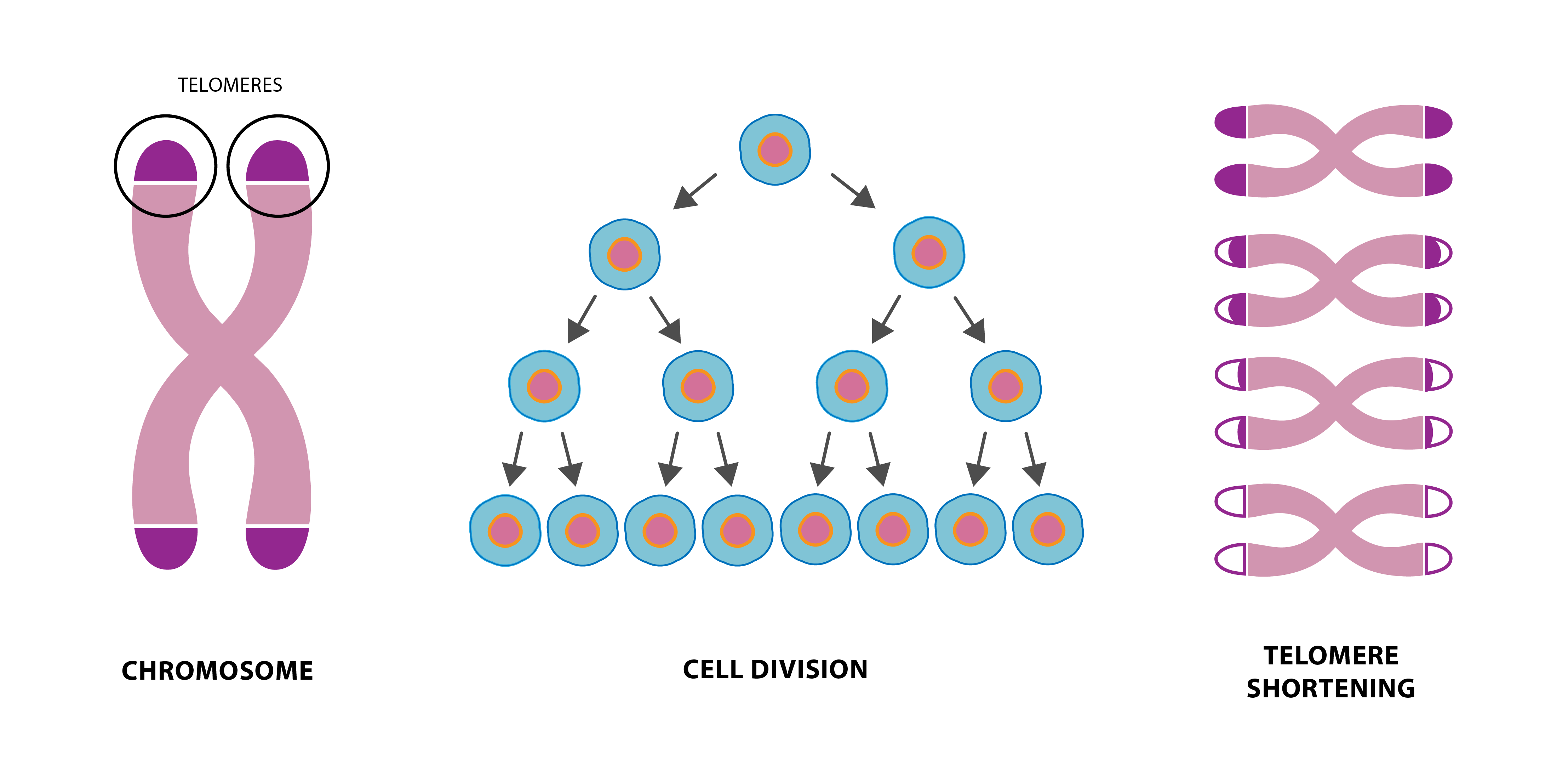
Your DNA's telomeres shorten with every cell division.
Mitochondria – The Engine of the Cell
The mitochondria are the engine of a cell. They are responsible for converting glucose (sugar) into usable energy required to support cellular growth, protein synthesis, and many other critical cellular processes. Without the mitochondria, the cells within the body would not be able to survive.
Like DNA, over time, it can become harder for mitochondria to perform at their peak due to declining nutrients and repeated external damage.
A lack of crucial nutrients like NAD+, PQQ, SuperOxide Dismutase, CoQ10, and other antioxidants (cancer-fighting molecules) can't protect the cells from damage nor aid in the repair of the cells that have been damaged.
If our cells don't have the energy required to perform, we don't have the energy to reach our health goals. That's why our mitochondria must have the necessary nutrients to prevent and repair the damage.
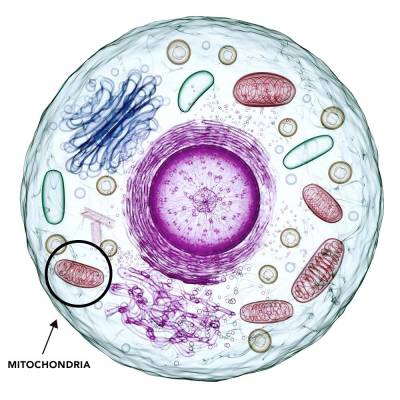
The Mitochondria
Sirtuins – The Guardians of Cellular Functions
Sirtuins are a family of seven proteins that help regulate cellular health. Sirtuins play a critical role in managing and maintaining optimal cellular function and protecting DNA and mitochondrial health. They directly affect aging, inflammation(1), and stress resistance by helping to repair cellular damage. Sirtuins use NAD+ as fuel to operate, but as we age, the prominence of NAD+ declines in our cells. Without NAD+ sirtuins cannot maintain healthy cellular functions like cellular repair. Sirtuins can be activated by increasing NAD+ though NMN supplementation.
NAD+ – The Fuel for Cellular Health
NAD+ stands for nicotinamide adenine dinucleotide, a substance found in all living cells. It's the fuel to power sirtuins' protective and restorative abilities. It has even been called “an anti-aging molecule" because of its many essential roles in promoting cellular health and prolonging our lifespan. Without NAD+ in our cells we would be dead in 30 seconds.
Scientists first discovered NAD+ and started studying its benefits in the early 1900s. Only in recent years have they begun to understand its full potential in helping repair cellular damage.
NAD+ is called a “helper molecule" because it binds to other enzymes in the body to activate them and generate molecular reactions. When a cell is low on this critical coenzyme, additional essential functions like cell repair can't happen. This makes NAD+ one of the most vital in maintaining and supporting cellular health.
NAD+ supports key biological processes like:
- Repairing and protecting DNA
- Energy metabolism
- Immune cell function
- Lifespan
- Cellular repair and energy
- Slowing down the speed of aging
- Maintaining mitochondrial function
- Epigenetics, the reader of our genes
- Hundreds of metabolic processes
NMN, Nicotinamide Mononucleotide, Precursor to NAD+
NMN is a precursor to NAD+, which means it turns into NAD+ once it has been taken into our bodies. There are only two ways to increase NAD+ in our bodies, one is to take a precursor like NMN or an NAD+ IV Drip. Within 2 – 3 minutes after taking NMN orally, it begins converting to NAD+ and within 15 minutes is is completely absorbed into our tissue. It is converted and stored immediately as NAD+ in tissues like the liver, skeletal muscle and the cortex. Studies have been done to show that orally administered NMN is quickly absorbed, efficiently transported into blood circulation and immediately converted to NAD+ in major metabolic tissues. NMN supplementation reinstates NAD+ levels in the body reversing the aging process and preventing age-associated diseases.
Antioxidants — The Defenders of Cellular Health
NAD+ isn’t the only micronutrient to influence and support good cellular health. Three key antioxidants PQQ, SuperOxide, and CoQ10, are all cellular health maximizers. When combined with NAD+ they help prevent the human body and organs from aging.
1) PQQ (pyrroloquinoline quinone) is a natural compound that exists in our cells. It’s a coenzyme and potent antioxidant — around 100 times more effective than vitamin C at eliminating free radicals. Free radicals are damage-causing molecules that can cause cancer. PQQ also helps to repair and restore the mitochondria, which boosts and transfers energy for cell regeneration. It also enhances the formation of new mitochondria and cellular energy production. It has 50+ years of research behind it—more than 800 studies.
2) SuperOxide Dismutase or SOD is another potent antioxidant, anti-inflammatory, and free radical fighter. It protects cells, rebuilds tissue, and wards off disease. SOD’s primary task is to protect cells from toxic oxygen metabolites that a generated through energy production — converting superoxide into molecular oxygen and hydrogen peroxide that the body can safely dispose of. Superoxide Dismutase has also been used to treat arthritis, prostate problems, corneal ulcers, burn injuries, inflammatory diseases, inflammatory bowel disease, and long-term damage from exposure to smoke and radiation.
3) CoQ10 (Coenzyme Q10 or ubiquinone) is a nutrient that occurs naturally in the body. It is vital for energy production by supporting mitochondrial function. It also acts as a potent antioxidant by scavenging reactive oxygen species. This helps in protecting cells against oxidative stress in many neurodegenerative diseases. CoQ10 also starts to decline with age. Without CoQ10, the mitochondria cannot function and as a result, energy production is diminished. Additionally, cells are susceptible to free radical damage due to the loss of CoQ10’s antioxidant protection.
What Can Damage Your Cellular Health?
Did you know every 7–10 years all the cells in our body are replaced with new cells? You basically have a whole new body about every decade. So why don’t you look the same as you did 10 years ago? The short answer is cellular damage degrades each copy of your DNA.
There are a variety of factors that can contribute to cellular damage and affect the performance of DNA, mitochondria, and sirtuins. The most common are environmental, stress, nutrition, inactivity, lifestyle, and genetics. But, by far, the biggest factor is aging.
The longer we live, the more cellular damage we accumulate and the less youthful and vibrant we look and feel. That is why we must understand what contributes to this damage so we can work to minimize and even avoid it in the first place.
Environment
The environment basically refers to anything outside of our bodies. It is filled with radiation and toxins that can contribute to cellular damage.
Low levels of radiation are all around us. Some are from natural sources like space and the sun, and others are artificial like power lines, cellphones, microwaves, and medical devices. While some of the more serious natural radiation is blocked by our planet's atmosphere, we are still exposed to artificial sources of radiation and ultraviolet radiation (UV) from the sun every day. Even in small doses, the damage over decades can add up.
There are also countless toxins from air and water pollution, industrial manufacturing, and pesticides that can build up in our systems and damage our cellular health as well.
Stress
A lot of people think that stress is an emotional experience, but it’s a physical one, too. A growing body of research blurs the need to separate emotional from physical states. In a review of 23 animal studies, researchers found that acute and chronic stress influenced how well mitochondria could function, especially in the brain(2). This altered state, could explain why psychological stress translates into physical and cellular damage.
Poor Nutrition
What is put into your body affects all cells and their ability to function correctly. Getting the right vitamins and minerals and avoiding over-supplementation of micronutrients can play a key supportive role in maintaining good cellular health. Heavy processed diets that lack proper nutritional value starve your cells.
Inactivity
Inactivity and poor physical fitness can contribute to cellular damage as well. The more in shape and physically active you are, the healthier your body’s organ systems will stay and the better your cellular functions will perform. This is especially true when maximizing muscle tissue and minimizing fat levels.
Lifestyle
Certain lifestyle choices can be very detrimental to your cellular health. Drinking alcohol and smoking cigarettes are two common substances that can damage your cells. Cigarettes alone have over 7,000 chemicals, at least 250 are known to be harmful, including hydrogen cyanide, carbon monoxide, and ammonia (3, 4) and among those at least 69 can cause cancer.
Disease
Certain diseases can even affect your health at a cellular level. For instance, some diseases affect your body’s ability to make new cells, or they may impact cells’ ability to fight off other diseases. You should always speak to a doctor if you suspect that you have a cell-related disease or condition, as these conditions can be very long-lasting and have wide-ranging health effects.
Genetics
Some people are genetically fortunate to be born with a robust genetic code that enables them to maintain healthy cells longer into old age than others. But the truth is, what we put in our body and how we treat our body affects our health far greater than genetics. Only about 20% of our cellular health is ultimately affected by genetics, the other 80% comes from how we treat our bodies.
Aging
The leading contributor to declining cellular health is aging. As we get older the collective cellular damage builds up in our body. Part of that continued build up of cellular damage is because essential nutrients like NAD+ are in decline.
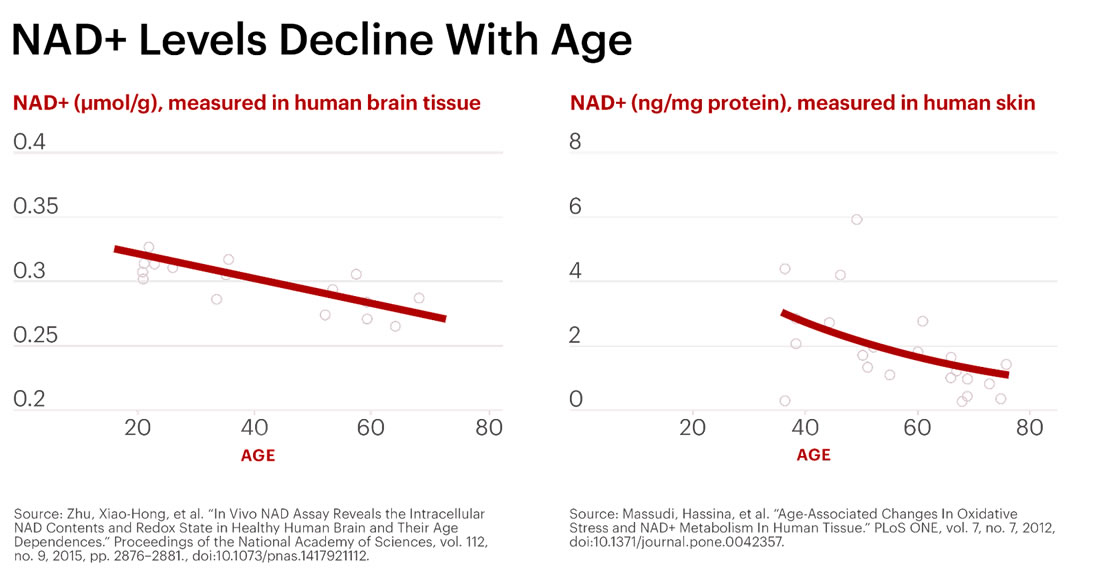
As mentioned previously, NAD+ is an essential fuel that helps sirtuins protect and repair cells. Without enough present, cellular damage is allowed to run rampant.
How Can You improve Your Cellular Health?
Improving and maintaining good cellular health is about ensuring all cells have adequate NAD+ and other critical micronutrients (like PQQ, SuperOxide Dismutase, and CoQ10) to enable their biological machinery to function, protect, and repair damage.
Improving your cellular health doesn't need to be complicated. Depending on where you are in your cellular health journey, three approaches can maximize your cellular and whole-body health.
- Preventative – Minimizing Cellular Damage
- Proactive – Maintaining Good Cellular Health
- Restorative – Repairing Poor Cellular Health
The preventative approach to minimizing cellular damage
Avoiding exposure to cellular damage is a crucial first step to preventing and slowing the signs of aging. To minimize damage:
1) Focus on modifying your activities, lifestyles, and behaviors to remove as many negative factors as possible.
2) If you are unsure where to start, begin by listing all the possible activities that could be causing cellular damage in your life.
3) Number the list from most significant risk to least risk. This will help you become more self-aware and help you to prioritize what you need to deal with first.
The proactive approach to maintaining good cellular health
Don't wait for your cellular health to decline to act. Look to implement proactive activities that will support good cellular health today. Some cellular damage is inevitable, but it can be minimized. Consider proper dietary nutrition and a regular fitness regimen as proactive approaches to maintaining a healthy you from the outside-in.
Another proactive approach to supporting your cellular health is to include a cellular health supplement into your daily wellness routines before the physical signs of aging appear. Cellular health supplementation helps to maintain an abundance of NAD+ and other micronutrients in your cells and maximizes cellular protection.
The restorative approach to repairing cell damage and aging
Finally, when cellular damage has set in and physical signs of aging have become apparent, it's time to focus on a restorative approach to repairing cellular damage.
The best way to counter this accumulative damage and bring cells back into good health is to incorporate cellular health supplements into your daily routine. Cellular health supplements with critical micronutrients like NMN, PQQ, SuperOxide Dismutase, and CoQ10 are essential to increasing NAD+ production which replenishes cells with the indispensable fuel that enables repair and rejuvenation of cell damage.
Conclusion
Cellular health is a critical element of whole-body health. Including it as part of your wellness routines can only benefit you on your journey to maintaining and maximizing your quality of life regardless of your specific health goal. If you’re ready to kickstart your cellular health journey we recommend you check out WITH-N.
WITH-N is the ultimate NAD+ cellular health supplement, uniquely formulated with 5 (NMN, PQQ, CoQ10, SuperOxide Dismutase, and BioPerine) of the latest science-backed super-nutrients plus vitamins and minerals to restore, rejuvenate, and energize the body from within.
Click here to learn more about the benefits of WITH-N.
Ready To Try Our Whole-Body Cellular Health Products?
Our products merge the best of science and nature, creating your simple path to total cellular health.
With-N ®
Cell Renewal Activation NAD+ Booster
The ultimate once-a-day cellular health supplement. With-N is formulated with essential NAD+ precursors and micronutrients required to restore energy and whole-body health, starting with your cells from the inside out.
Virg-N ®
Youth Activation Serum
Bring back that youthful glow with a potent emulsion serum concentrate with over 30 natural exotic science-back micronutrients optimized to defend against the elements and revitalize your skin’s cells.
Zero-N ®
Brain Health Formula
Maximize brain health and focus with a premium formulation of science-backed nootropic micronutrients optimized to reinvigorate the brain at the cellular level.
Footnote
1) Journal of Leukocyte Biology. Sirtuin deacylases: a molecular link between metabolism and immunity.
2) Psychosomatic Medicine. Psychological Stress and Mitochondria: A Conceptual Framework.
3) S. Department of Health and Human Services. The Health Consequences of Smoking—50 Years of Progress: A Report of the Surgeon General.
4) S. Department of Health and Human Services. How Tobacco Smoke Causes Disease: The Biology and Behavioral Basis for Smoking-Attributable Disease: A Report of the Surgeon General.
Subscribe To Our Mailing List
Stay informed on the latest cellular health news, products and exclusive offers.
SHOP | CELLULAR HEALTH | ABOUT | SUPPORT | MEDIA | PRIVACY | TERMS | AFFILIATE OPPORTUNITY
These statements have not been evaluated by the Food and Drug Administration.
These products are not intended to diagnose, treat, cure or prevent any disease. Consult your healthcare professional before using any dietary supplement.
©2019-2025 RenovoVita, Inc. All rights reserved
8924 E Pinnacle Peak Rd, G5 404 Scottsdale, AZ 85255
